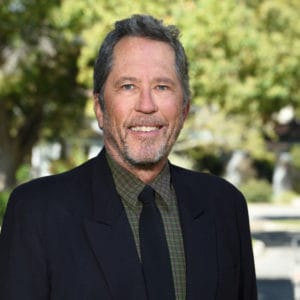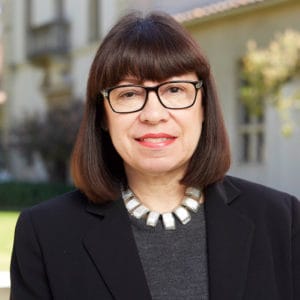Faculty
-

David Pagel
Professor of Art Theory and History
Roland Reiss Endowed Chair in Art
Faculty Coordinator, Center for Business & Management of the ArtsResearch Interests
Art, Art media, Painting, Contemporary Art, Art Criticism, Museums and Creativity
-

Jay Prag
Clinical Full Professor
Academic Director
Faculty Coordinator, Center for Business & Management of the ArtsResearch Interests
Corporate Finance, Investments, Economics of Strategy, Macroeconomics
-

Joshua Goode
Professor of Cultural Studies and History
Chair, Cultural Studies DepartmentResearch Interests
Modern Spain, 19th- and 20th-century Europe, Genocide and racial thought, Museums and commemoration, Memory
-

Kristine Kawamura
Clinical Professor of Management
Research Interests
Responsible management, Care (as a strategic resource), Values-based management systems, Leadership, Organizational strategy and culture, Cross cultural competence, Human performance and resilience
-

Bronwyn Mauldin
Director of Research and Evaluation at the Los Angeles County Department of Arts and Culture
-

Alma Ruiz
Adjunct Professor
Research Interests
Contemporary Latin American Art, Exhibition Making & Managing
-

Curriculum
A typical course of study would be:
Fall – Year 1
- Introduction to Arts Management (4 units)
- Legal Foundations of the Arts (4 units)
- Principles and Practices of Fundraising I (2 units)
- Marketing Management (2 units)
- Elective (4 units)
Spring – Year 1
- Finance & Accounting for the Creative Industries (4 units)
- Capstone A (4 units)
- Field Study Practicum (0 units)
- Electives (4-8 units)
Fall – Year 2
- Capstone B (4 units)
- Electives (4-8 units)
Field Study
Field study travel provides behind-the-scenes access to artists, art businesses and organizations, and leaders in the field. The trips are designed to accelerate the formation of international networks and ensure familiarity with the complexity of the international arts landscape. All students are required to go on one field study trip.
View recent itineraries:
Past global destinations include:
- Beijing, China
- Cape Town, South Africa
- Hong Kong
- Mexico City, Mexico
- Shanghai, China
- Seoul, South Korea
- Singapore
- Taipei, Taiwan
- Tokyo, Japan
- UAE: Abu Dhabi and Dubai
Past domestic destinations include:
- Las Vegas, Nevada
- Marfa, Texas
- San Francisco, California
Capstone Sequences
Every Arts Management student completes a capstone sequence, which is the culmination of your degree, synthesizing everything that you have learned throughout the program. It is designed as a bridge to your professional life, serving as a powerful demonstration of the skills you’ve developed at CGU as you enter or continue your work in the arts and cultural field. Each capstone sequence comprises both course work and a final project or deliverable that stems from your own intellectual and creative pursuits.
Students in the Arts Management program may complete their degree requirements through any sequence below.
Practicum Sequence
Explore the arts and cultural field with partnering arts organizations such as museums, theaters, presenters, funders, and government agencies.
You might act as a consultant, providing valuable work related to the organization’s articulated needs and goals. Or you might act as a researcher and observer, offering data and insights about the organization’s place and operations within the larger arts ecosystem. Work closely with a partnering organization and faculty to present your work and findings for feedback and assessment. Some organizations offer a stipend; others do not.
Entrepreneurship Sequence
Develop cutting edge business skills to launch a new venture for the arts and cultural sector.
You will study the principles of startups from initial concept through prototyping, market testing, and business plan development. You will study alongside MBAs in the Drucker School of Management and practice working with and speaking to people across disciplines and industries.
Thesis Sequence
Complete your degree requirements with the successful execution of an academic master’s thesis.
This thesis will most likely stem from completed coursework that stimulated your curiosity. Master’s theses are primarily research-driven and draw upon both original research and secondary sources. You will take courses with MA and PhD students in the School of Arts & Humanities and produce a thesis that contributes new knowledge to the arts and culture field.
Electives
A highlight of the Arts Management program is the ability to take a total of 16 units of elective courses. In addition to electives offered by Arts Management program, students may take courses in other departments and programs, such as:
Archival Studies
Art
Cultural Studies
Educational Studies
Entrepreneurship
Evaluation
History
Leadership
Management
Marketing
Museum Studies
Music
Organizational Science
Politics and Policy
Transdisciplinary Studies
Application Guidelines
| Item | Description |
|---|---|
| Application Fee | $80 |
| Official Transcripts | Yes |
| Resume | Yes |
| Interview | Yes |
| Other Requirements | Applicant Questionnaire |
CGU operates on a priority deadline cycle. Applicants are strongly encouraged to submit complete applications by the priority dates in order to assure maximum consideration for both admission and fellowships.
Once the priority deadlines have passed, the University will continue to review applications for qualified candidates on a competitive, space-available basis. The final deadlines listed are the last date the University can accept an application in order to allow sufficient time to complete the admissions, financial aid, and other enrollment processes.
Spring 2024
Priority Deadline – November 1, 2023
Final Deadline (International) – November 15, 2023
Final Deadline (Domestic) – December 1, 2023
Classes begin – January 16, 2024
Summer 2024
Priority Deadline – February 1, 2024
Final Deadline (International) – March 1, 2024
Final Deadline (Domestic) – April 1, 2024
Classes begin – May 13, 2024
Fall 2024
Priority Deadline – February 1, 2024
Final Deadline (International) – July 5, 2024
Final Deadline (Domestic) – August 1, 2024
Classes begin – August 26, 2024
Application Checklist
The Claremont Graduate University online application is hosted online by Slate Technolutions via a secure web server. You will create a username and password so that you can return to continue your application over several sessions and check your status after submission. After you submit your application, it is made available for review by our faculty and staff.
The application fee is non-refundable.
Applicants must submit a sealed, official transcript from every undergraduate and graduate institution that has granted the applicant a degree. Electronic transcripts sent to admissions@cgu.edu are also accepted. For undergraduate coursework, applicants are required to submit proof of a completed bachelor’s degree from a regionally accredited college or university. Unofficial copies of transcripts are accepted for review purposes, but official copies will be required upon admission.
Applicants currently earning a degree that will be completed prior to attending CGU are required to submit a transcript showing work in progress for evaluation purposes. Once the degree has been granted, a final official transcript documenting the degree conferred must be submitted to CGU.
International applicants are advised to review the International Transcript Guidelines for additional information on submitting international transcripts.
Applicants must submit an up-to-date copy of their resume.
A valid score on one of the following examinations TOEFL, IELTS, Pearson PTE scores is required of all non-native English-speaking applicants. The examination is not required for the following applicants:
- Citizens or permanent residents of countries where English is the sole official language of instruction, e.g., Australia, Bahamas, Barbados, Canada (except Quebec), England, Ghana, Ireland, Jamaica, Kenya, New Zealand, Nigeria, Scotland, St. Vincent and the Grenadines, Trinidad, Tobago, Uganda, and Wales (see the CGU Bulletin for a complete list of accepted countries).
- Applicants who hold an undergraduate or advanced degree, or will have earned such a degree prior to enrolling at CGU, from an institution in the US or in countries where English is the sole official language of instruction (see above).
- Applicants who have successfully completed an academic English pre-master’s or intensive graduate bridge program from a nationally recognized, regionally accredited four-year college or university in the United States in the last two years, with submitted evidence of successful completion, and subject to curriculum approval.
CGU’s school code for the TOEFL exam is 4053.
International applicants are encouraged to visit our International Applicants page for more information, including score requirements.
Upon review of your application, you may be invited for an interview, which is required for admission. An admission decision will not be issued until the interview is complete.
GMAT or GRE examination scores are required. Scores must be dated within the past five years. Request that an official GMAT or GRE score be sent to admissions directly from Educational Testing Service (ETS). Information on examination waivers can be found below.
Scores must be sent directly to CGU by the testing agency.
CGU’s school codes:
GMAT DZK-QS-08
ETS (GRE and TOEFL) 4053
Waiver Information
For this program, an applicant may request a waiver for the GMAT/GRE exam based on any of the following qualifications:
Academic Work
- A bachelor degree in a business subject from an AACSB or EQUIS accredited school
- A bachelor of science degree in finance, accounting, business analytics, or STEM (science, technology, engineering, and math)
- The equivalent of 4 units of undergraduate or graduate courses in statistics or calculus with a grade of B+ or better at an accredited institution
- An official score in the 50th percentile or higher on a test that assesses quantitative skills such as MCAT, PCAT, DAT, or OAT
- Students or alumni who graduated in the past five years from a partner institution (the Claremont Colleges, Southwestern Law School, Art Center College of Design)
Professional Work
- Five years or more of professional work experience with a strong quantitative component
- A licensed CPA, CFA, CMA, or Professional Engineer designation
To request a waiver, please send the applicable information to admissions@cgu.edu at the time you have begun an application for admission.
For each of the questions below, please provide a separate response of no more than 100 words maximum. You will be able to upload your responses to your applicant status page following the submission of your online application.
1. What is motivating you to pursue a graduate management degree or certificate at this point in your life?
2. Describe your goals and how our program will help you reach them.
3. How do the Drucker School and Peter Drucker’s ideals align with your personal brand?
4. How might you contribute to the program? What qualities do you possess that would benefit the program and/or your fellow students?
5. What might be the biggest challenge you will face at if you enroll in this program?
Cost & Aid
ESTIMATED TUITION (CALIFORNIA RESIDENTS, NON-RESIDENTS, INTERNATIONAL)
| Program | 40 units |
| Tuition per unit* | $2,020 |
*Based on 2023-2024 tuition rates.
STUDENT FEES (PER SEMESTER)
| $245 Student Fee |
| $150 Technology Fee |
| International Student Services Fee*: $661 fall semester, $776 spring semester **Applies to all international students (F-1 visa only) who are registered in coursework, doctoral study, or continuous registration. The fee is assessed each fall and spring semester for annual ISO accident and sickness plans and administrative fees. Subject to change. |
For estimates of room & board, books, etc., please download CGU’s Cost of Attendance 2022-2023 .
TRAVEL FEES (PER SEMESTER)
| $3,400 (Semester 2 only)** |
**Arts Management students are required to travel in semester two, which includes visits to arts institutions and events both domestic and international, based on viability and safety of selected destinations These fees allow the programs to buy tickets and make programming reservations in advance. Travel costs for the academic program are calculated and charged during registration for the second semester. Individual courses that include their own field study component may require additional travel fees.
Travel is currently optional and will be dependent on Covid-19 restrictions. The health and safety of students is the priority.